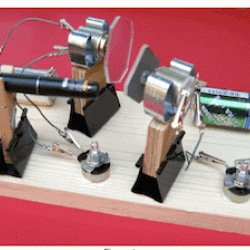Source Institutions
Source Institutions
Add to list Go to activity

In this activity, learners use a laser pointer and two small rotating mirrors to create a variety of fascinating patterns, which can be easily and dramatically projected on a wall or screen. In this version of the activity, learners use binder clips to build the base of the device. Educators can use a pre-assembled device for demonstration purposes or engage learners in the building process. [Activity is publicly available through a web crawler capture on Archive.org.]
- 10 to 30 minutes
- 1 to 2 hours
- Over $20 per group of students
- Ages 11 - 18
- Activity, Demonstration
- English
Quick Guide
Materials List (per group of students)
- laser pointer
- wood or plywood base
- 3 large binder clips
- 12 inches of double-sided foam tape, 1/2 in wide, cut into 5 pieces 2 in long and 2 pieces 1 in long
- 2 pieces plywood, 1/2 in x 2 1/2 in x 1 1/2 in
- 2 spring grip broom clips
- 2 motors, 1.5-3 volt
- 2 potentiometers, 20 or 25 ohm
- mirror, plastic (plexi-mirror) 1 1/2 in x 1 1/2 in
- mirror, plastic (plexi-mirror) 2 in x 2 in
- 2 screws, sheet metal, #8 x 5/8 in, pan head, Phillips
- 12 alligator clips
- 3 ft copper wire, #22 insulated, solid, cut into 6 pieces 6 in long
- clothespin, wood, with spring
- hot glue gun
- hot glue sticks
- electric drill
- 7/64 in drill bit
- 2 washers, steel, SAE #8
- 2 batteries, D
- needle-nose pliers
- masking tape
- screw driver, Phillips
- wire stripper
- 6 sheet metal screws, #10 x 1/2 in, pan head, Phillips (optional)
- 12 nails, bright finishing, 1 1/2 in (optional)
- 2 knobs for potentiometers (optional)
- 5/64 in drill bit (optional)
- hammer (optional)
- cable tie, approx 8 in (optional)
Subjects
-
Engineering and Technology
-
Engineering
- Electrical Engineering
- Mechanical Engineering
-
Engineering
-
Physical Sciences
-
Electricity and Magnetism
- Electric Motors
- Electric Circuits
- Vibration and Waves
-
Light and Optics
- Lasers
- Lenses and Mirrors
-
Motion and Forces
- Machines
- Rotation Motion
-
Electricity and Magnetism
-
The Nature of Science
-
The Scientific Process
- Conducting Investigations
-
The Scientific Process
Informal Categories
- Electronics
Audience
To use this activity, learners need to:
- see
- touch
Learning styles supported:
- Involves hands-on or lab activities
Other
Components that are part of this resource:
This resource is part of:
Access Rights:
- Free access
By:
- Rathjen, Don
Rights:
- All rights reserved, Exploratorium, 2006
